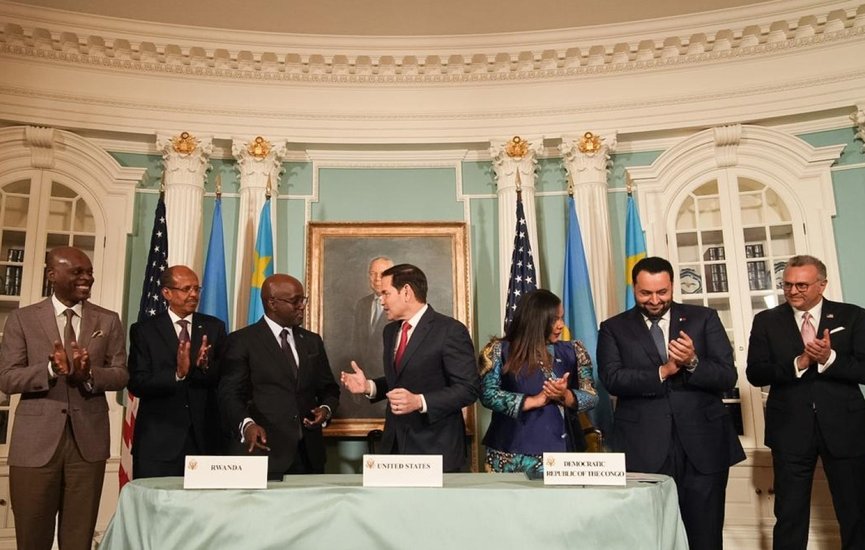Behind last week’s U.S.-brokered peace deal between Rwanda and the Democratic Republic of Congo lies a lesser-known but striking subplot: Togo’s quiet quest to become West Africa’s Rwanda.
At the Washington signing ceremony, Togolese Foreign Minister Robert Dussey stood alongside U.S. Secretary of State Marco Rubio, representing Togo’s role as an African Union mediator. It was a moment of visibility for a country that rarely draws international headlines.
Tiny Togo is playing in a big arena. The peace agreement—between Rwanda, one of Africa’s most dynamic economies, and the DRC, one of its largest and most resource-rich—calls for mutual respect of territorial integrity, an end to support for armed groups and cross-border military actions, and the creation of a joint security mechanism to sustain peace.
Beyond diplomacy, the accord sets a foundation for regional economic integration, with Rwanda and the DRC pledging to cooperate on de-risking critical clean-energy mineral supply chains, expanding hydropower and gas production from Lake Kivu, and investing in mineral processing—all areas that could draw American investment.
Togo’s aspiration to emulate Rwanda may seem improbable. Wedged between Ghana and Benin, with only a 32-mile coastline on the Atlantic, Togo is a small state with modest geopolitical heft. Yet in recent years, it has deliberately aligned itself with Rwandan President Paul Kagame, seeking both inspiration and partnership.
This budding alliance has been marked by high-level visits: Togolese leader Faure Gnassingbé, President of the Council of Ministers, made an official trip to Kigali in January, followed by his return for the Global AI Summit in April.
In late 2021, Rwanda agreed to assist Togo in building a modern transport system with cashless payments and to foster a “culture of excellence” in public service delivery. A year later, Togo followed Rwanda into the British-led Commonwealth, a notable move for a Francophone country, formalized during the 2022 summit in Kigali. For Rwanda, Togo offers an opening to project influence westward.
During Gnassingbé’s January visit, Kagame praised “the good cooperation we have had for a long time between our two countries,” vowing to deepen ties further.
At the Kigali tech summit, Gnassingbé echoed Kagame’s futurist tone. He urged African nations to deploy AI in health, education, and agriculture, and championed the idea of “digital sovereignty”—avoiding dependence on foreign platforms while harnessing Africa’s culturally rich data. “Our data should be better collected, better structured, and valued and protected,” he said. It should also, he noted, help train global AI models.
He called for “massive” investment and training to help Africa’s youth compete in the AI era.
For Togo, this is more than rhetoric. It’s a bid to reinvent itself—not just as a stable West African nation, but as a tech-forward, diplomatically agile player modeled on Kagame’s Rwanda. Whether it succeeds remains to be seen. But for now, Togo is no longer sitting on the sidelines.
For now, more conventional economic wins top Togo’s agenda. The African Development Bank is backing an agro-industrial hub to process rice, soy, sesame, and other agricultural goods—a bid to add value to rural production. Meanwhile, a Sri Lankan textile investment recently created 2,200 jobs, which President Faure Gnassingbé celebrated on Facebook as a success for his industrial strategy and the “Made in Togo” initiative.
“The choice of Togo is no coincidence,” said Charlie Komar, CEO of Charles Komar & Sons, at the opening of the sprawling new factory last week, according to the Sunday Island newspaper. “We chose this country because we see a rising nation, a government focused on economic stability, infrastructure development, and investment appeal.”
It’s a win. But trouble is brewing at home for the 59-year-old Gnassingbé, who has ruled Togo for two decades. Protests erupted in Lomé on June 26 in response to a controversial constitutional change that sidelines voters from directly choosing the country’s president—raising fears that Gnassingbé could remain in power for life. According to an Afrobarometer survey, eight in ten Togolese support presidential term limits, and roughly three-quarters want to choose their leaders through elections.
Despite an average GDP growth rate of 5 percent since 2013, the World Bank warns that the expansion is “insufficient to support rapid poverty reduction,” held back by “stagnant agricultural productivity” and a lack of climate resilience. On the security front, Togo has leaned on Turkish support to counter al-Qaeda-linked militants pushing south from the Sahel, according to a recent U.S. Army report.
Adding to the contradictions, Togo—despite its diplomatic success in the Rwanda-DRC peace deal—was among seven countries recently hit by new U.S. visa restrictions. A June presidential order cited “high overstay rates” for Togolese nationals: one in five business or tourism visa holders overstayed their permitted stay, and roughly a third of academic and exchange visitors remained beyond their visa limits. Twelve other countries, including Sudan and Somalia, were also affected.
The move could signal closing doors for Togolese youth looking westward. But it may also redirect their gaze 2,000 miles east—to the hills of central Africa, where a model and inspiration await. The path to the future may no longer run through Washington. For Togo, it may pass through Kigali.
